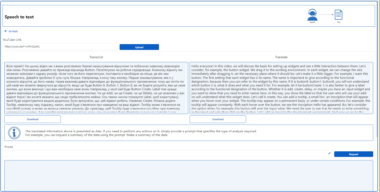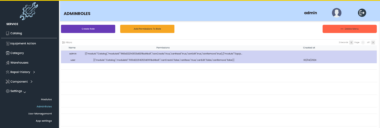UBOS Asset Marketplace: Remote MCP Server on Cloudflare Workers
In the rapidly evolving landscape of AI and Large Language Models (LLMs), the ability to seamlessly connect these models with external data sources and tools is paramount. Enter the Model Context Protocol (MCP), an open protocol designed to standardize how applications provide context to LLMs. UBOS, as a full-stack AI Agent Development Platform, recognizes the critical importance of MCP in facilitating the creation of robust and versatile AI Agents. This article explores the deployment and utilization of a remote MCP server on Cloudflare Workers, empowering developers to leverage the full potential of contextualized AI interactions. This integration enables the orchestration of AI Agents, connection with enterprise data, custom AI Agent development with LLM models, and the creation of Multi-Agent Systems – all core functionalities of the UBOS platform.
Understanding the Model Context Protocol (MCP)
Before diving into the specifics of deploying an MCP server, it’s essential to grasp the underlying principles of the Model Context Protocol. MCP acts as a bridge between AI models and the external world, allowing them to:
- Access Real-Time Data: Instead of relying solely on their pre-trained knowledge, AI models can access up-to-date information from various sources.
- Interact with Tools and APIs: MCP enables AI models to call external functions, execute commands, and perform actions based on contextual understanding.
- Enhance Reasoning and Decision-Making: By incorporating external context, AI models can make more informed and accurate decisions.
By standardizing this interaction, MCP promotes interoperability and simplifies the development of AI-powered applications.
Setting Up a Remote MCP Server on Cloudflare Workers
Cloudflare Workers provides a serverless execution environment, ideal for deploying lightweight and scalable applications. Setting up a remote MCP server on Cloudflare Workers involves several key steps:
1. Local Development
Begin by cloning the necessary repository and installing the required dependencies:
bash git clone git@github.com:cloudflare/ai.git cd ai npm install npx nx dev remote-mcp-server
This allows you to run the MCP server locally and test its functionality.
2. Connecting the MCP Inspector
The MCP Inspector is a valuable tool for exploring and interacting with your MCP API. Start it with npx @modelcontextprotocol/inspector. Within the inspector, configure the Transport Type to SSE and enter the URL of your local MCP server (e.g., http://localhost:8787/sse). After connecting, you’ll be able to list and call any defined tools.
3. Integrating with Claude Desktop
For a more immersive experience, connect your local MCP server to Claude Desktop. Follow Anthropic’s Quickstart guide and modify the Claude configuration file to point to your local server:
{ “mcpServers”: { “math”: { “command”: “npx”, “args”: [ “mcp-remote”, “http://localhost:8787/sse” ] } } }
This configuration allows Claude to interact with your MCP server, enabling it to leverage external tools and data within its conversational context.
4. Deployment to Cloudflare
To deploy your MCP server to Cloudflare, follow these steps:
- Create a KV namespace:
npx wrangler kv namespace create OAUTH_KV - Add the KV namespace ID to your
wrangler.jsoncfile. - Deploy the server:
npm run deploy
5. Remote MCP Client Connection
After deploying, you can connect to your remote MCP server using the MCP Inspector. Simply enter the workers.dev URL of your deployed worker in the inspector.
6. Connecting Claude to the Remote MCP Server
Update the Claude configuration file to point to your remote MCP server’s workers.dev URL. Restart Claude for the changes to take effect.
{ “mcpServers”: { “math”: { “command”: “npx”, “args”: [ “mcp-remote”, “https://worker-name.account-name.workers.dev/sse” ] } } }
Use Cases
The remote MCP server opens up a wide range of use cases, including:
- Real-Time Data Integration: Connect AI models to live data feeds for up-to-date information.
- Automated Task Execution: Enable AI models to trigger external actions and automate workflows.
- Personalized Recommendations: Provide context-aware recommendations based on user data.
- Enhanced Customer Service: Integrate AI models with CRM systems for personalized customer interactions.
Specific examples include:
- Financial Analysis: An AI agent can use a remote MCP server to access real-time stock prices, perform calculations, and provide investment recommendations.
- E-commerce: An AI agent can leverage customer purchase history and browsing behavior (accessed via MCP) to provide personalized product suggestions.
- Healthcare: An AI agent can access patient medical records (with appropriate security measures) to assist doctors in diagnosis and treatment planning.
Key Features
The remote MCP server offers several key features:
- Scalability: Cloudflare Workers provides a highly scalable environment, ensuring your MCP server can handle increasing traffic.
- Security: Cloudflare’s security features protect your MCP server from malicious attacks.
- Cost-Effectiveness: Serverless architecture minimizes infrastructure costs.
- Flexibility: The MCP protocol allows you to integrate with a wide range of tools and data sources.
- OAuth Login: Securely manage access to your MCP server.
Debugging Tips
- Restart Claude: If you encounter issues, restarting Claude can often resolve them.
- Direct Connection: Test the connection to your MCP server using the
npx mcp-remotecommand. - Clear Authentication Files: In rare cases, clearing the files in
~/.mcp-authmay help.
UBOS: Empowering AI Agent Development
UBOS is a full-stack AI Agent Development Platform focused on bringing AI Agents to every business department. The platform provides the tools and infrastructure necessary to:
- Orchestrate AI Agents: Manage and coordinate the activities of multiple AI Agents.
- Connect with Enterprise Data: Seamlessly integrate AI Agents with your existing data sources.
- Build Custom AI Agents: Develop AI Agents tailored to your specific needs, leveraging your own LLM models.
- Create Multi-Agent Systems: Design complex systems where multiple AI Agents collaborate to achieve common goals.
The integration of a remote MCP server on Cloudflare Workers is a crucial step towards building robust and versatile AI Agents. By leveraging UBOS, developers can streamline the development process and unlock the full potential of contextualized AI interactions. This solution is crucial for businesses aiming to leverage AI agents in various departments, ensuring seamless integration and efficient operation.
The use of Cloudflare Workers for hosting the MCP server allows for unparalleled scalability and reliability. UBOS ensures secure authentication and authorization, vital for enterprise-level applications. UBOS supports various LLMs, allowing developers to pick the most suitable model for their AI agent.
In conclusion, deploying a remote MCP server on Cloudflare Workers and integrating it with platforms like UBOS offers a powerful solution for creating AI-driven applications that can access real-time data, interact with external tools, and make more informed decisions. This integration is crucial for any organization looking to harness the power of AI Agents to drive innovation and improve efficiency. With the capabilities of UBOS, businesses can build and deploy customized AI solutions that adapt to changing business needs and deliver exceptional results.
Remote MCP Server on Cloudflare
Project Details
- LiteraturePro/mcp-server
- Last Updated: 4/23/2025
Recomended MCP Servers
MCP Server for Vercel AI SDK with Figma and magic-mcp integration

MCP server for connecting agentic systems to search systems via searXNG
An MCP server for octomind tools, resources and prompts
A lightweight mcp server that tells you exactly what time is it based on your IP.

A secure Model Context Protocol (MCP) server providing filesystem access within predefined directories
My clone repository

MCP server that fetches GitHub Pull Request comments


An MCP tool that provides AI with the ability to compress and decompress local files.
 From vibe coding to vibe deployment. UBOS MCP turns ideas into infra with one message.
From vibe coding to vibe deployment. UBOS MCP turns ideas into infra with one message.






